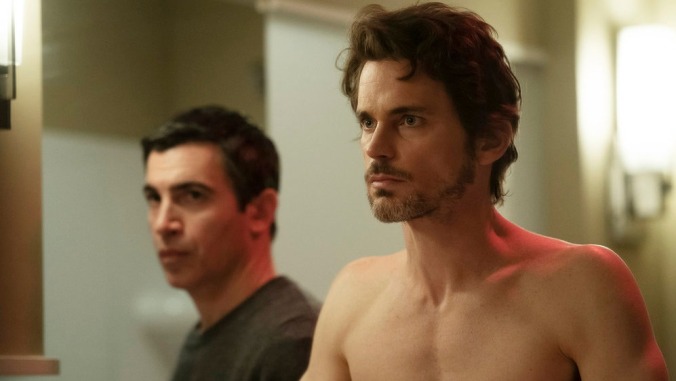There’s a scene right around the halfway point of “Part VII” where Harry goes to visit Jamie in prison. Having secretly recorded the teacher confessing to letting Nick Haas die, detective Harry Ambrose turns over the recording, the police arrest Jamie, and the precinct takes Harry out to a bar to toast the most unconventional cop on the force. (How many of his fellow police would let themselves be buried alive, just to net a confession?) The next day, Harry sits down across the table from the guy he just had collared for murder, and starts to apologize to Jamie, saying he knows they had a connection. And anyone watching the scene unfold is likely thinking, Uhhh, does this seem like a bad idea to anyone else?
They’d be right. Harry’s wildly unprofessional behavior immediately comes back to bite him in the ass again this episode. After getting demoted to desk duty for his previously unsanctioned tactics of following around a suspect all night as he parties throughout New York City and tracking Jamie’s phone without a warrant, Harry managed to pull a rabbit out of a hat: He got his suspect to confess, on tape. And all it took was being buried alive. There’s some fun in the early minutes of this episode, depending on whether or not you remember the last installment ending with Jamie nailing shut the coffin and yanking out Harry’s breathing tube. (The experience wouldn’t work unless Harry really thought he was going to die, Jamie explains.) Harry hallucinates, Jamie digs him up, the two share a bonding conversation, and Jamie confesses. Harry turns over the evidence, and case supposedly closed. But that last visit to Jamie in prison is a bridge too far; the judge at Jamie’s hearing, already reeling from the bizarre reveals of Harry following Jamie all night (“stalking,” in the defense lawyer’s framing) and willingly being buried alive, is seemingly pushed over the edge by the post-arrest visit. Harry apologized—for what, the judge wants to know? Our protagonist has no reply. Wrong answer.
Now that the season has shifted to focus more on the crisis gripping Harry’s life, and transforming Jamie into more of a classic antagonist (Matt Bomer even participates in the time-honored ritual of a character embracing the darkness within by cutting off their hair), we’re seeing the endgame unfold. We thought we were watching the story of Jamie’s unraveling, and we are; but more importantly, we’re seeing Harry Ambrose grapple with an identity crisis so severe, the consequences might prove fatal for people he cares about. The episode concludes with Jamie appearing to murder Harry’s boss and friend right in the middle of a golf course, and given his current mental state, there’s no indication he’ll stop there. “I never wanted to hurt anyone,” he insists, but this makes the third time—fourth, if you count his failed attempt to smother the old man in hospice care—his actions have suggested otherwise.
And that’s what makes Jamie’s self-righteous bluster ultimately ring hollow, and helps this season of The Sinner find a moral center, such as it is. For all of Jamie’s pronouncements about the importance of facing the void, of being completely honest with yourself, he can’t even come clean about his own desires. “You’re just waking up,” he tells Harry after pulling him out of the grave, and at no point does he seem to harbor the slightest understanding that his philosophy of radical death-confrontation has already given the lie to all his earnest pleas of just wanting to shake himself out of his torpor. He’s a murderer, but he won’t acknowledge the way his actions define him. “That isn’t me,” he protests, every time someone calls him out on his hypocrisy, but Jamie can’t have it both ways. He’s not misunderstood patsy and accidental repeat murderer. But in his self-deluded justifications, that’s the only explanation that makes sense.
Harry, by contrast, has never wanted to come clean about his own motivations, or his conflicted soul. He leaves his own celebration party to visit Sonya, and after she tells him about Jamie’s late-night visit, ending in the killer’s standing in front of her naked, he demands to know why she didn’t tell him, how she could allow that to happen. After some unsatisfactory (to Harry, anyway) explanations about how she was “drawn to what tortures him,” that his overwhelming desire to be seen as he is overcame her fear, she accurately diagnoses Harry’s obsession with getting everyone around him to tell him everything, while he offers almost nothing in return. Sure, he’ll tell her what happened with Jamie (and she’s right, he needs some therapy), but he won’t tell her how he really feels about all of it. Harry offers the surface, but never the depths.
It’s interesting to watch season three slowly find its way back to the same overt themes and issues that drove previous seasons, even though it’s done it with a much more straightforward story. How you move on from pain, the lies we tell ourselves to keep going, the passions and fetishes we embrace in hopes of either invigorating or numbing ourselves to the world around us—these are the issues raised by the series. They may be extreme cases, and yes, even Harry is a pretty broad outlier compared to most of us, but it’s still a larger-than-life version of the miniature battles we all grapple with throughout our lives.
Which is what makes the conversation between Jamie and his former student Emma such a breath of fresh air. He launches into one last spiel about how they’re lonely travelers, searching for truths no one else can understand, blah blah blah, when she suddenly pulls him up short. “Actually, I’m feel like I’m doing okay!” she says, and he can’t help blurting out a startled, “You are?” Turns out, the reveal of her Adderall problem, and the pressures she’s been under, have made her family very understanding. Openness and honesty about the situation made things better. She looks healthier and happier than she has all season. And that’s Jamie’s ultimate flaw: For all his braggadocio, simple honesty is beyond his ken. Leela tells him confessing is the only way to expiate his guilt—“Like an infection,” as she describes it—and he can’t even hear her words. So now, he’s got a restraining order against him from his wife and child, no job, no plans, and a head full of rage against Harry Ambrose. It’s no coincidence he’s stopped asking the fortune teller if he should step forward; Jamie stepped beyond a feasible life long ago.
Stray observations
- Jamies really is convinced Harry will be his protégé the way he was Nick’s. The guy is blind to his own oversights in more ways than one.
- Harry’s visions at the start of this episode have been some of the only times this entire season the series has engaged in its usual symbolic vision-tableaus; overall, it’s been a much more sedate season, visually speaking.
- That being said, it was nice to see Nick come back one more time for the requisite hair-cutting scene. Never enough Chris Messina.
- The exchange between Leela and Jamie in their front yard, with the cop waiting to arrest Jamie at the slightest provocation, felt pained and real in a way some of the couple’s previous scenes have danced around. It was excellent.
- One more episode: Anyone want to weigh in on their predictions for the conclusion of this story?



















![HBO teases new Euphoria, Larry David, and much more in 2026 sizzle reel [Updated]](https://img.pastemagazine.com/wp-content/avuploads/2025/12/12100344/MixCollage-12-Dec-2025-09-56-AM-9137.jpg)






















